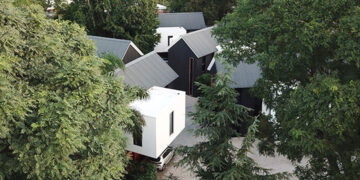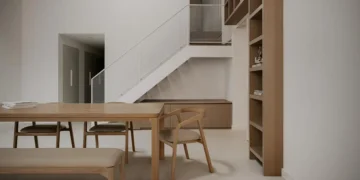
Portland’s weather poses unique challenges for roof durability. With its frequent rain, high humidity, and occasional snow, roofs in this region face year-round exposure to moisture, leading to potential water damage and mold growth.
ARCHITECTURE
Homeowners often find themselves undertaking more maintenance due to these conditions, as the persistent dampness can accelerate wear and tear on roofing materials.
The mix of wet weather and temperature fluctuations can cause roofing materials to expand and contract, which stresses the underlying structure. This process can result in cracks, leaks, or even structural damage over time. Quality roofing materials and proper installation are crucial in extending the lifespan of roofs in Portland’s demanding climate.
Many Portland residents opt for materials like metal or asphalt shingles, which tend to withstand the local weather better than others. Regular inspections and maintenance also play a critical role in preserving roof integrity. The high annual precipitation rate necessitates a proactive approach to roof care, preventing minor issues from developing into costly repairs.

Understanding Portland’s Climate
Portland’s climate significantly impacts the durability of roofing materials. The city’s unique seasonal weather patterns and high levels of precipitation and humidity play a crucial role in the long-term health of rooftops.
Seasonal Weather Patterns
Portland experiences a mild maritime climate with distinct seasons. Winters are typically wet and cool, with temperatures rarely dipping below freezing. This can lead to issues such as water penetration and mold growth on roofs.
The relative lack of rainfall during this period can alleviate some of the water-related stress on roofs. Spring and fall are transitional periods, marked by moderate temperatures and frequent rain showers. Snowfall in Portland is minimal but not unheard of. Occasional snow can add weight and cause freeze-thaw cycles, which may stress roofing materials.
Precipitation and Humidity Influence
Portland receives an average annual rainfall of about 36 inches. This high level of precipitation, combined with humidity, can accelerate wear and tear on roofing materials. Consistent moisture can cause wood to rot, metal to corrode, and shingles to loosen.
Humidity levels are typically high year-round. This constant moisture in the air can promote moss and algae growth on roofs, especially those made from organic materials like wood or asphalt. These organisms can retain water, leading to additional stress on roofing structures.
Frequent rain showers, especially in the spring and fall, necessitate rigorous roof maintenance schedules. Ensuring proper drainage and ventilation is crucial to mitigate the effects of Portland’s wet climate on roof longevity.
Roof Material Suitability
Portland’s distinct weather patterns require careful consideration when choosing roof materials. The following subsections evaluate the performance of various roofing materials under Portland’s unique climate conditions.
Asphalt Shingles and Weather Resilience
Asphalt shingles are popular due to their affordability and ease of installation. In Portland, their resistance to rainfall is a significant advantage. Oswego Roofing highlights the importance of selecting high-quality, algae-resistant shingles to combat the region’s humidity.
Despite their benefits, asphalt shingles may not fare well in heavy snowfall or ice accumulation, which is less of an issue in Portland. Regular maintenance, such as clearing debris and ensuring proper ventilation, can extend their lifespan and effectiveness.

Metal Roofing Durability
Metal roofing offers impressive durability and can withstand Portland’s heavy rainfall and occasional snow. Metal roofs resist corrosion and algae growth, making them suitable for the humid climate. Oswego Roofing notes that metal roofs are also energy-efficient, reflecting heat and reducing cooling costs.
These roofs require professional installation to ensure proper sealing and insulation. Although initially more expensive, metal roofing’s long-term durability and low maintenance needs often justify the investment.
Flat Roofing in Portland’s Weather
Flat roofs present unique challenges in Portland’s wet climate. They are prone to water pooling, which can lead to leaks and structural damage. To address these issues, Oswego Roofing recommends installing high-quality waterproof membranes and ensuring adequate drainage systems.
Regular inspections and maintenance are crucial for flat roofs. Clearing debris and checking for damage can prevent water-related problems. While less popular for residential use, flat roofs are often chosen for commercial buildings due to their practicality and space efficiency.
Maintenance Strategies for Enhanced Durability
Proper roof maintenance in Portland requires specific strategies to address the constant moisture and potential moss growth that can damage roofs over time.
Regular Inspections and Repairs
Conducting regular inspections is crucial. Oswego Roofing recommends twice-annual roof checks, ideally in spring and fall. Inspections should focus on identifying damaged shingles, flashing issues, and clogged gutters.
Dealing With Moss and Debris
Moss and debris can significantly shorten a roof’s lifespan. In Portland’s wet climate, moss thrives on damp roofs, leading to water retention and potential leaks.
An annual roof cleaning is recommended to remove moss and debris.
Chemical treatments can also prevent moss growth. Roofing experts like those from Oswego Roofing suggest using zinc or copper-based solutions. Routine cleaning with a broom or low-pressure washer helps maintain roof health.
All images by © Reinaldo Coser, see the whole project on Archiscene – Murillo 1665 by Estudio Santiago Fernandez + Candida Tabet Arquitetura



















